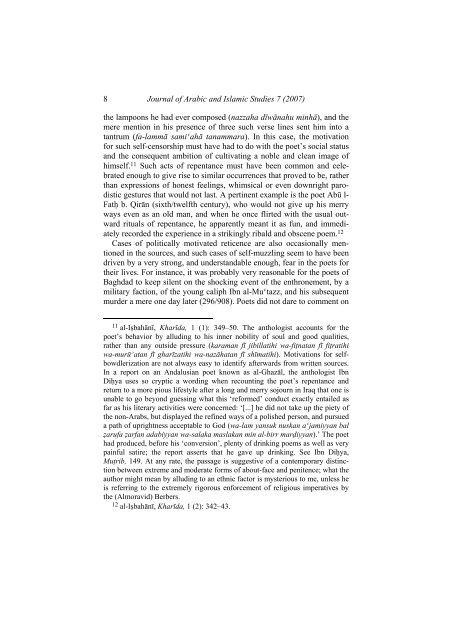Freedom of Expression and Censorship in Medieval Arabic Literature
Freedom of Expression and Censorship in Medieval Arabic Literature
Freedom of Expression and Censorship in Medieval Arabic Literature
You also want an ePaper? Increase the reach of your titles
YUMPU automatically turns print PDFs into web optimized ePapers that Google loves.
8<br />
Journal <strong>of</strong> <strong>Arabic</strong> <strong>and</strong> Islamic Studies 7 (2007)<br />
the lampoons he had ever composed (nazzaha dīwānahu m<strong>in</strong>hā), <strong>and</strong> the<br />
mere mention <strong>in</strong> his presence <strong>of</strong> three such verse l<strong>in</strong>es sent him <strong>in</strong>to a<br />
tantrum (fa-lammā samiʿahā tanammara). In this case, the motivation<br />
for such self-censorship must have had to do with the poet’s social status<br />
<strong>and</strong> the consequent ambition <strong>of</strong> cultivat<strong>in</strong>g a noble <strong>and</strong> clean image <strong>of</strong><br />
himself. 11 Such acts <strong>of</strong> repentance must have been common <strong>and</strong> celebrated<br />
enough to give rise to similar occurrences that proved to be, rather<br />
than expressions <strong>of</strong> honest feel<strong>in</strong>gs, whimsical or even downright parodistic<br />
gestures that would not last. A pert<strong>in</strong>ent example is the poet Abū l-<br />
Fatḥ b. Qirān (sixth/twelfth century), who would not give up his merry<br />
ways even as an old man, <strong>and</strong> when he once flirted with the usual outward<br />
rituals <strong>of</strong> repentance, he apparently meant it as fun, <strong>and</strong> immediately<br />
recorded the experience <strong>in</strong> a strik<strong>in</strong>gly ribald <strong>and</strong> obscene poem. 12<br />
Cases <strong>of</strong> politically motivated reticence are also occasionally mentioned<br />
<strong>in</strong> the sources, <strong>and</strong> such cases <strong>of</strong> self-muzzl<strong>in</strong>g seem to have been<br />
driven by a very strong, <strong>and</strong> underst<strong>and</strong>able enough, fear <strong>in</strong> the poets for<br />
their lives. For <strong>in</strong>stance, it was probably very reasonable for the poets <strong>of</strong><br />
Baghdad to keep silent on the shock<strong>in</strong>g event <strong>of</strong> the enthronement, by a<br />
military faction, <strong>of</strong> the young caliph Ibn al-Muʿtazz, <strong>and</strong> his subsequent<br />
murder a mere one day later (296/908). Poets did not dare to comment on<br />
11 al-Iṣbahānī, Kharīda, 1 (1): 349–50. The anthologist accounts for the<br />
poetʼs behavior by allud<strong>in</strong>g to his <strong>in</strong>ner nobility <strong>of</strong> soul <strong>and</strong> good qualities,<br />
rather than any outside pressure (karaman fī jibillatihi wa-fiṭnatan fī fiṭratihi<br />
wa-murūʾatan fī gharīzatihi wa-nazāhatan fī shīmatihi). Motivations for selfbowdlerization<br />
are not always easy to identify afterwards from written sources.<br />
In a report on an Andalusian poet known as al-Ghazāl, the anthologist Ibn<br />
Diḥya uses so cryptic a word<strong>in</strong>g when recount<strong>in</strong>g the poetʼs repentance <strong>and</strong><br />
return to a more pious lifestyle after a long <strong>and</strong> merry sojourn <strong>in</strong> Iraq that one is<br />
unable to go beyond guess<strong>in</strong>g what this ‘reformedʼ conduct exactly entailed as<br />
far as his literary activities were concerned: ‘[...] he did not take up the piety <strong>of</strong><br />
the non-Arabs, but displayed the ref<strong>in</strong>ed ways <strong>of</strong> a polished person, <strong>and</strong> pursued<br />
a path <strong>of</strong> uprightness acceptable to God (wa-lam yansuk nuskan aʿjamiyyan bal<br />
ẓarufa ẓarfan adabiyyan wa-salaka maslakan m<strong>in</strong> al-birr marḍiyyan).’ The poet<br />
had produced, before his ‘conversionʼ, plenty <strong>of</strong> dr<strong>in</strong>k<strong>in</strong>g poems as well as very<br />
pa<strong>in</strong>ful satire; the report asserts that he gave up dr<strong>in</strong>k<strong>in</strong>g. See Ibn Diḥya,<br />
Muṭrib, 149. At any rate, the passage is suggestive <strong>of</strong> a contemporary dist<strong>in</strong>ction<br />
between extreme <strong>and</strong> moderate forms <strong>of</strong> about-face <strong>and</strong> penitence; what the<br />
author might mean by allud<strong>in</strong>g to an ethnic factor is mysterious to me, unless he<br />
is referr<strong>in</strong>g to the extremely rigorous enforcement <strong>of</strong> religious imperatives by<br />
the (Almoravid) Berbers.<br />
12 al-Iṣbahānī, Kharīda, 1 (2): 342–43.

















